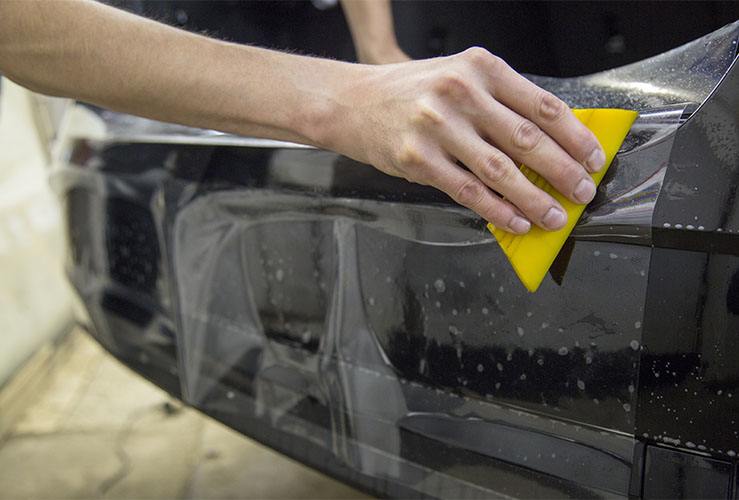What is PPF for cars?
Paint protection film (PPF) is a transparent layer placed over parts of a vehicle that are vulnerable to chips, rocks and other road debris.
As with a ceramic coating, car PPF offers protection from dirt and debris from scratching the paintwork of the car.

Where was paint protection film first used?
PPF was developed during the Vietnam War by US firm 3M - after it was tasked by the US government to make a film to protect helicopter rotor blades from shrapnel and other debris.
What is car PPF made from?
Also known as 'helicopter tape', PPF is made of urethane. The original tape was not designed to improve the aesthetics of helicopters - in fact it lent them a dull, cloudy appearance.
Other general names for PPF:
- Car Scratch Protection Film
- Rock Chip Protection
- Clear Bra
- Clear Mask
- Invisible Shield
- Clear Wrap
Why might I invest in PPF for my car?
Regular motorway driving
Driving on a road with loose chips/gravel is far more damaging at high speeds than lower speeds.
If you often drive on the motorway, your bodywork may benefit from paint protection film.
If you live near poor roads/tracks
Paint protection film may be a good option if you live near poorly-maintained roads with gravel, chips and other debris on them, or if you often drive on gravel tracks - perhaps because you live in a rural area.
Self-healing properties of PPF
PPF products have "self healing" properties: if your ppf car wrap film gets scratched, you can apply a little heat (such as from a hair dryer) and the unwanted marks will vanish.
This feature is possible due to the use of elastomeric polymer on the surface of the PPF, which as well as possessing self-healing properties, helps mold and seal over the bodywork.
Film configurations for your driving style
Film types/configurations can vary depending on your driving style/environment.
When it comes to applying PPF to a car, the protection film may be placed on the bonnet and on high traffic areas such as wing mirrors - or ppf may be placed on the entire surface area of a vehicle.
PPF application: Choosing which parts of the car to cover
If you don’t opt for full-vehicle PPF wrap, you might choose which areas to protect, including: side mirrors, leading-edge bonnet; full bonnet; bumpers; rocker panels, fender panels; door handle cavity; and boot ledge.
It's not just rocks and chips...
Today’s PPF also protects against threats like acid rain, UV exposure, bird droppings and mineral deposits.
Is there normally a warranty for PPF?
Most car PPF products - paint protection films - come with a 10 year warranty.
Some of the main PPF brands are:
- Suntek paint protection
- Xpel Ultimate
- Xpel paint protection film
- Llumar Platinum
- 3M Pro Series line
Is PPF the same as vinyl coverings?
Vinyl is a heavier material that affords more protection, but it is not as transparent as PPF and cannot self-heal.
What paint protection film won't do
Paint protection film probably won't enhance your vehicle's shine, although it won’t diminish it either.
PPF car protection products are also unlikely to help keep your car clean any more effectively than having an unprotected paint job.
Can I fit PPF myself?
While there's no reason why you can’t attempt to fit PPF to your vehicle by yourself, hiring an experienced car PPF fitter will help ensure the final finish of the PPF application looks smooth and professional.
Paint protection film maintenance by a skilled technician can also help extend the life and appearance of the application.
How much does a PPF car wrap cost?
In the UK PPF car wrap application services cost from £500 to £1,000, depending on the make and model (i.e shape and size). For example, applying PPf to a Lamborghini Aventador will take longer than applying a PPF covering to a Mini!




